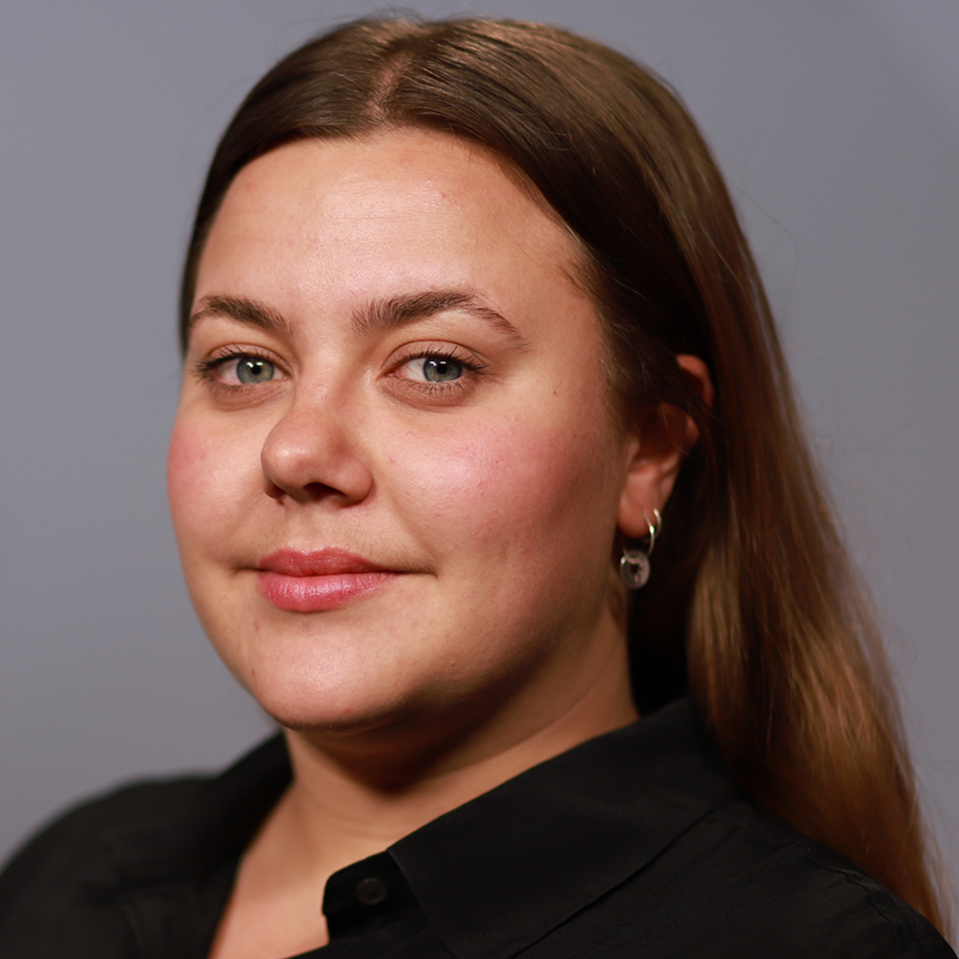Federal election: Albanese hits back at Trump's threats to tariff pharmaceuticals — as it happened
Prime Minister Anthony Albanese has again vowed to never negotiate on the Pharmaceutical Benefits Scheme in discussions with the United States on tariffs.
Meanwhile, Peter Dutton has officially unveiled the modelling behind the Coalition's gas policy. It comes as the federal election blog played host to an expert panel as they discussed electricity bills, green energy and the future of Australian power.
Follow along as we bring you the latest in today's blog.
Submit a comment or question
Live updates
This is where we'll leave you
Thank you for joining us on yet another jam-packed day of the campaign.
As always, we will be back tomorrow to bring you all the updates as the leaders head out on another day on the hustings.
In the meantime, you can check out the rest of today's online coverage at our Australia Votes page and you can try out the ABC's Vote Compass tool, to see how you align with the political parties.
Until then!
LoadingShorten believes Dutton's work-from-home policy backflip will cost him at election time
Former Labor leader Bill Shorten says Opposition Leader Peter Dutton's working-from-home policy backflip has left him vulnerable as the federal election comes closer.
On Monday, the Coalition backed away from its proposed working-from-home policy and a demand for "all" public servants to return to the office and made a major retreat on its promise to slash 41,000 Commonwealth jobs.
Dutton told Nine's Today program the Coalition had "made a mistake in relation to this policy, and I think it's important that we say that and recognise it".
A number of other Coalition politicians echoed the sentiment but also blamed Labor for attacking the policy, while Labor suggested it was a huge failure for the opposition.
Shorten suggested the backflip and the number of Coalition politicians coming out with the same lines as their party leader struck a desperate tone.
"That's absolutely the place you don't want to be if you're running an opposition campaign," Mr Shorten told 7.30.
You can read more via the link below
Palau president takes swipe at Peter Dutton over past 'sea levels' gaffe
The president of Palau has taken a thinly veiled swipe at Peter Dutton's decade-old quip about climate change, saying rising sea levels are not a "punchline" for the Pacific.
Surangel Whipps Jr has also urged the Coalition to back Labor's plan to co-host a major UN climate change conference with the Pacific, an idea which the opposition leader has called "madness."
The Coalition and Labor have traded blows over energy and climate policy throughout the election campaign, with the government warning that the Coalition's stance risks undermining Australia's strategic position in the Pacific.
Penny Wong also claims that Pacific leaders constantly bring up the 2015 incident when a boom microphone caught Dutton joking about Pacific leaders running late because "time doesn't mean anything when you're about to have water lapping at your door".
You can read more via the link below
Economic uncertainty will likely persist for some time, Council of Financial Regulators says
Treasurer Jim Chalmers has met with the Council of Financial Regulators today to discuss the global and domestic economic outlook.
Among the attendees were RBA governor Michele Bullock and ASIC chair Joe Longo.
In a statement, the council said its members are closely monitoring developments both within the nation's financial system and overseas.
It said it's expected the current period of uncertainty will persist for some time, but Australia's financial system is "strong and resilient".
Chalmers said the nation is "well prepared" to confront the volatility of the global economy.
" We're working closely with the financial regulators and we're confident about Australia's ability to respond to heightened global uncertainty, but we’re not complacent," he said in a statement.
" In these uncertain times, the progress we’ve made together and our plan to build a stronger and more resilient economy put Australia in good stead."
Is Dutton's gas policy a leftist idea?
Opposition Leader Peter Dutton has now unveiled the details of the Coalition's gas reservation policy.
It's aimed at reducing power bills for Australians, but there's been widespread criticism from the industry, with some experts saying it's a far-left policy.
On today's Politics Now podcast, Patricia Karvelas and David Speers broke it down.
"The Australia Institute, a left of centre think tank, they've certainly applauded this and made the rather clear line that the core of this is if you want to tax something, that's something you want less of," Speers says.
"Of course, that's not exactly what Peter Dutton's trying to do.
"The Australia Institute and the Greens want to see far less gas; Peter Dutton wants to see a whole lot more of it."
You can listen to the full episode here:
Two graphs illuminate the public service challenge facing Peter Dutton
The Coalition says it will shrink the public service by 41,000 jobs within five years, without forced redundancies or touching frontline services.
This week they confirmed they would reach their target through "natural attrition" — e.g. workers leaving the service of their own volition — and hiring freezes alone.
But some of the federal departments with the highest rates of staff attrition also happen to be those with large numbers of service delivery roles.
The graphs below show the departments with the highest rates of "separations", e.g. people leaving, and those with the most "service delivery" roles.
As you can see, there's some overlap. For example, as of December, about a third of all separations came from Services Australia (3,577) — the largest department in the public service, with about 67 per cent of staff working in "service delivery".
For all the nitty gritty details, you can read the full story below.
Coalition's priority is housing, Dutton says on international student caps
On ABC Radio Sydney, Chris Bath asks the opposition leader what he would say to business owners who rely on international students for staffing.
If elected, the Coalition has pledged to cap the number of international students able to commence study in Australian institutions at 240,000 each year.
Peter Dutton says there's a limit on the amount of hours people on visas can work, anyway.
"We have, frankly, if you speak to businesses at the moment, a labour market that's a bit soft, probably a bit easier to find workers than it was 12 months ago."
The opposition leader affirms the Coalition's first priority is making sure Australians have access to housing.
Why won't the Coalition commit to cutting the fuel excise for longer?
The Coalition has promised to halve the fuel excise for 12 months if elected on May 3.
At the leaders' debate last night, Peter Dutton was asked why he would not commit to extending the cost of living measure for an entire term of parliament.
But the opposition leader says it's more "sensible" to reassess the measure after a year.
"If you lock it in at a cost of $6 billion a year, it then blows out over the forward estimates," he says.
Dutton calls into ABC Radio Sydney
Opposition Leader Peter Dutton has called into ABC Radio Sydney.
Speaking with Chris Bath, he says he appreciates all the well wishes he has received today over his father's health following his medical emergency last night.
The pair move to discussing the Coalition's modelling for a national energy policy, released last night.
Dutton says he can't put an exact figure on how much households would save under the plan, but insisted bills would go down.
Vic Libs scramble to prevent Pesutto bankruptcy in wake of Deeming defamation loss
Federal and Victorian Liberal MPs and candidates are sweating over the prospect of former state leader John Pesutto being bankrupted by a bitter defamation battle, which would force him out of parliament during the federal election.
Late last year, fellow Liberal MP Moira Deeming won a defamation action she had brought against Pesutto and was awarded $315,000 in damages.
The Federal Court is now finalising how much the Hawthorn MP must pay in costs after losing the case, with Deeming seeking nearly $2.4 million.
Pesutto also owes his lawyers hundreds of thousands of dollars and there are fears a significant cost ruling against him could bankrupt the MP.
That would trigger a by-election, as bankrupted people are ineligible to sit in parliament.
"It would be a disaster for the party, and for John '' one party figure said.
Read the rest of the story at the link below. 👇
Albanese hopes Labor's tallest candidate can win over voters in Leichhardt
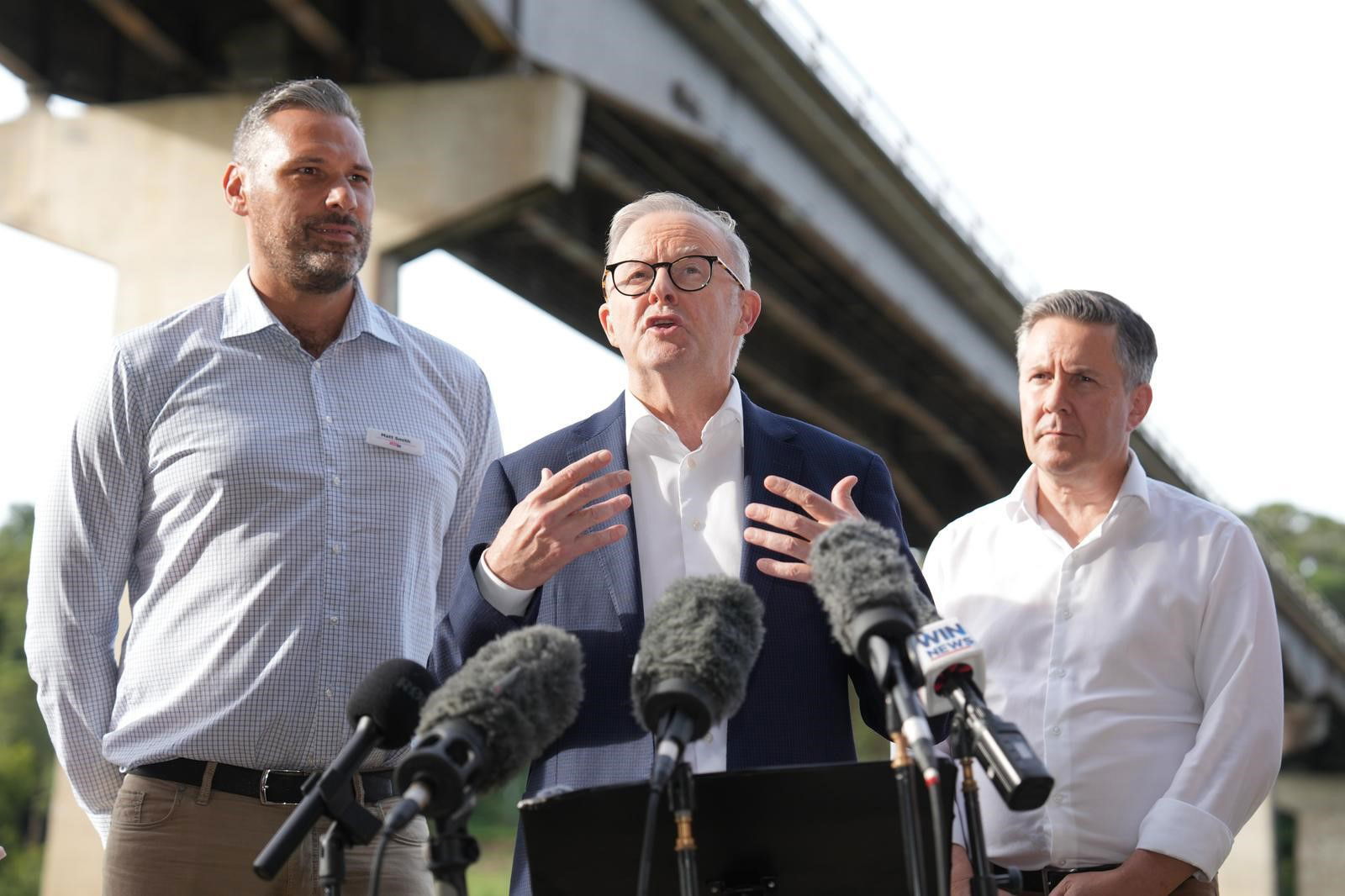
Anthony Albanese has swapped the distinctive green colour of a Medicare backdrop for a lush green backdrop on the Barron river.
A reporter jokes the prime minister should stand up the slope while next to Labor's candidate for Leichhardt Matt Smith, a former professional basketball player who is extremely tall.
"News flash, Matt is bigger than me!" the prime minister joked.
"It's just the way it is, I accept that."
Labor's spruiking a commitment to spend almost $250 million for a new bridge over the Barron River on the Kennedy Highway in the electorate of Leichhardt, which it's hoping to gain from the Coalition.
PM rules out changes to negative gearing
Anthony Albanese has firmly ruled out changes to negative gearing and the capital gains tax if Labor is re-elected.
"Yes! How hard is it? For the 50th time," he says, before trying to move onto another question.
The reporter persists, asking if Labor would also rule out offering up changes to negative gearing and the capital gains tax in return for a vote to pass legislation.
"Yes," he responded.
It comes after Greens leader Adam Bandt told the National Press Club he'd push for reforms in the next parliament, should the minor party hold the balance of power.
At the conclusion of his press conference, Albanese was again asked if he'd make any preference deals with the Greens.
"I'm asked about it every day. Very clearly, those things are a matter for the organisational wing," he says.
"We won't negotiate with the Greens before, during, after the election, about those matters."
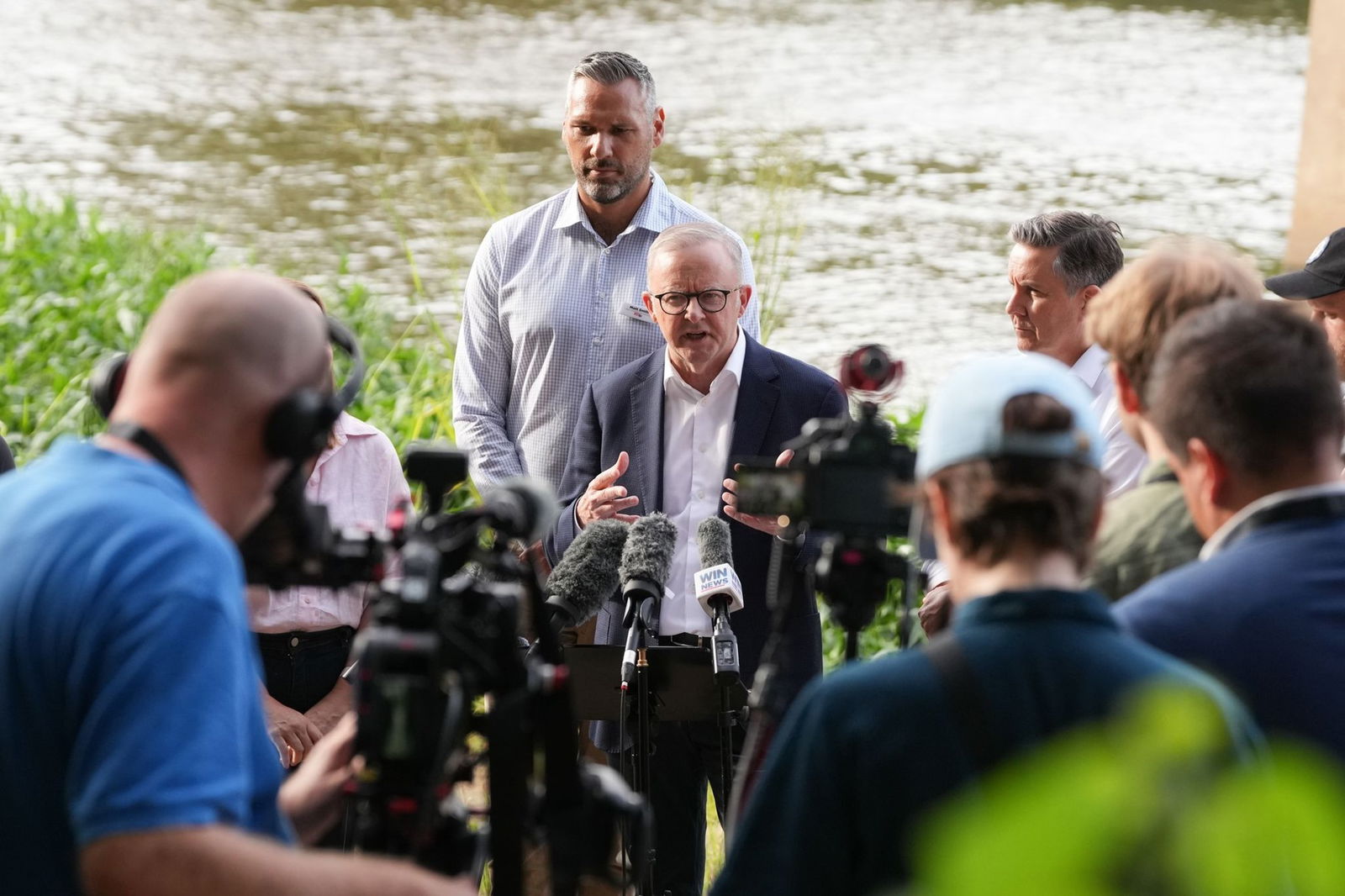
PM won't say if he feels vindicated after Trump mocked world leaders
Back to Trump.
Anthony Albanese is asked if he feels "vindicated" after US President Donald Trump mocked world leaders at a Republican Party black tie dinner in Washington, saying they were "calling us up, kissing my ass" to make a tariff deal.
The PM says he hasn't seen the comments from Trump.
"But that's not the way I deal with leaders," he says.
"The two conversations I've had with President Trump are ones in which I stand up for Australia's national interest and I will always do that," he says.
Are nuclear advancements in the Middle East a roadmap for Australia?
At the Your Say Forum, an audience member asked whether nuclear is boils down to a matter of political will, and pointed to nuclear reactors being built quickly in the Middle East.
Dylan McConnell said US President Donald Trump has shown "if political will is there, anything is possible".
"Doesn't mean that's a good idea to do it," he says.
McConnell says he struggles with comparisons to countries such as Iran and Bangladesh.
"I mean, we live in a democracy, a federal government as well.
"We have state governments to deal with here as well, that's often overlooked."
He says comparisons with other western democracies paint a less promising picture for nuclear.
"Since the beginning of this century, there have been five reactor starts or start construction, five.
"One of them didn't finish — it's a hole in the ground; it cost about $10 billion.
"And the ones that did, came at extreme cost overruns in the vicinity of, you know, two to five times over their original estimates and at significant delays in the vicinity of, you know, 20 years."
Albanese, Dutton discussed dad Bruce's medical emergency before start of debate
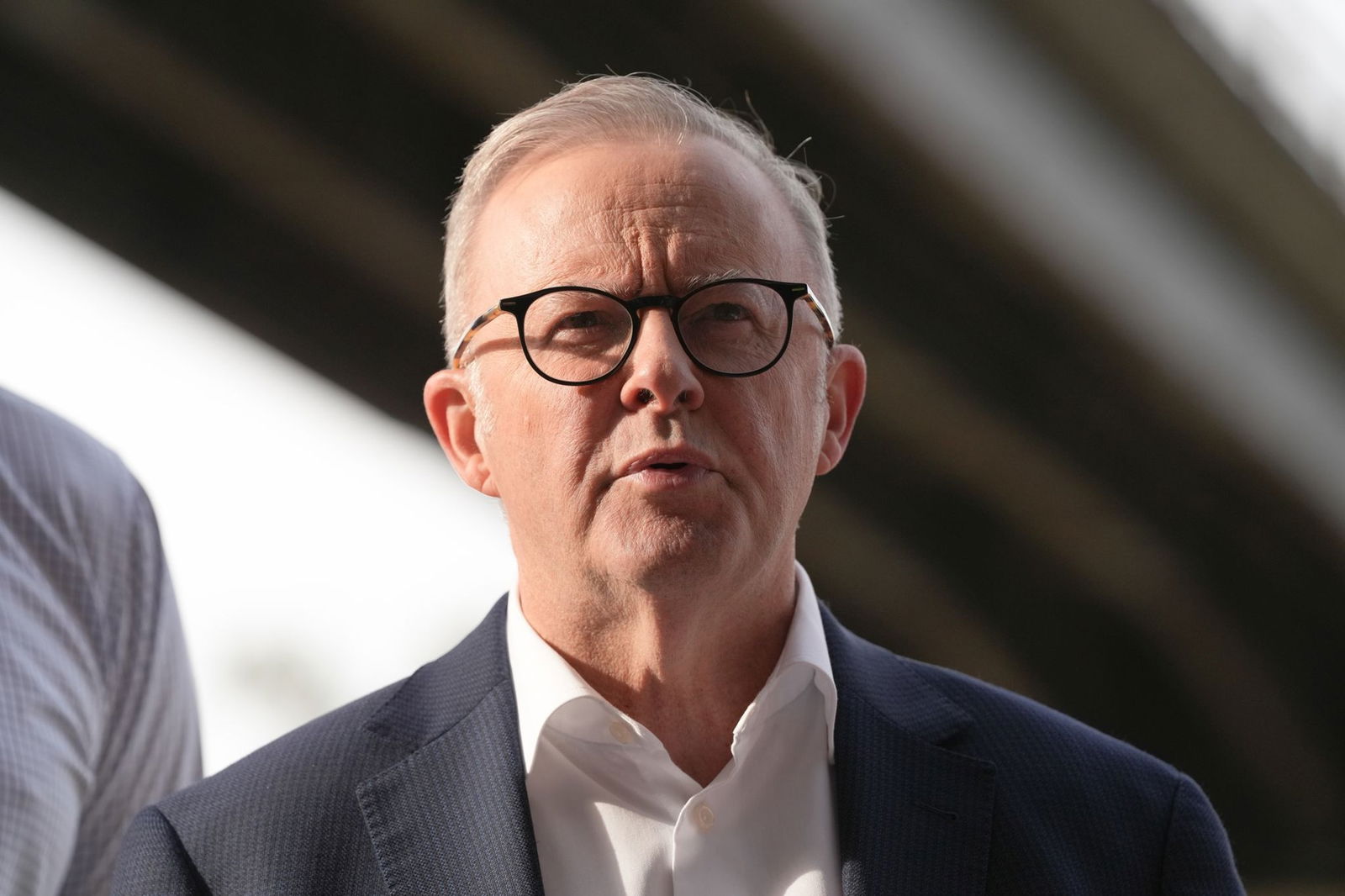
Anthony Albanese and Peter Dutton discussed Bruce Dutton's medical emergency before the first leaders' debate of the federal election.
The prime minister says he wished him and his family well.
"I spoke with Peter Dutton yesterday, before the debate … I wished him well, and of course, I wish, and I'm sure all Australians wish his father well as well, at this difficult time," he says.
"But of course, our health and the health of our family members always comes first."
Why it's difficult to put a price tag on a renewables transition
So what is the cost of renewables, then?
Earlier in the forum, Ali Moore asked if anyone on the panel can give a ballpark figure on the cost of a renewables transition.
"A lot more than people think it will," she was told by Andrew Richards.
He said while Australia is in the middle of an infrastructure boom, it's difficult to get the skills and equipment needed into the country.
"These are challenges, as I think Tony mentioned, that are just outside government's control because we're not the only country trying to do this.
"We're actually competing against some very large economies who are looking to do exactly the same thing."
Moore asked whether this means voters should believe anyone who does put a price on the renewables transition.
That's been the challenge, Tony Wood said.
"I think one of the things we're probably all going to agree on is that this was never going to be cheap and easy, and we were promised that it would be," he continued.
But he said Australia shouldn't give into the temptation to throw in the towel because it feels hard.
"This is not a choice we have, to stop.
"The really important issue is, do we now take a bit of a fork in the road?
"Because climate change is no longer debated in terms of its reality, it's upon us in Australia now.
"So, how well we do it dictates how much progress we've made, not whether we do it or not."
Are renewables really unreliable?
Continuing on from our place at the Your Say Forum, Tony Wood jumps in, telling Ali Moore his issue with nuclear "is not really so much about the cost", but "the unspeakable" safety risks.
He says Australia already has a Plan A (renewables), which it should commit to first.
"If it turns out ... [we're] running into more trouble as we get towards the really high end of renewables, then we might have to think about something else," he says.
"Now, hydrogen maybe, more storage, other forms of batteries, there are lots of alternatives but that's not a problem for today."
Woods notes that Price described renewables as unreliable because the sun doesn't always shine.
"Renewables are not unreliable," he says in response.
"I can tell you what time the sun will come up, absolutely reliable in 500 years' time."
He adds that batteries (and system costs) come in when the wind isn't blowing and the sun doesn't shine.
"You know, the system costs have to be considered and that's where I think the debate really has to fall."
PM fires back at Trump's threat to slap tariffs on pharmaceuticals
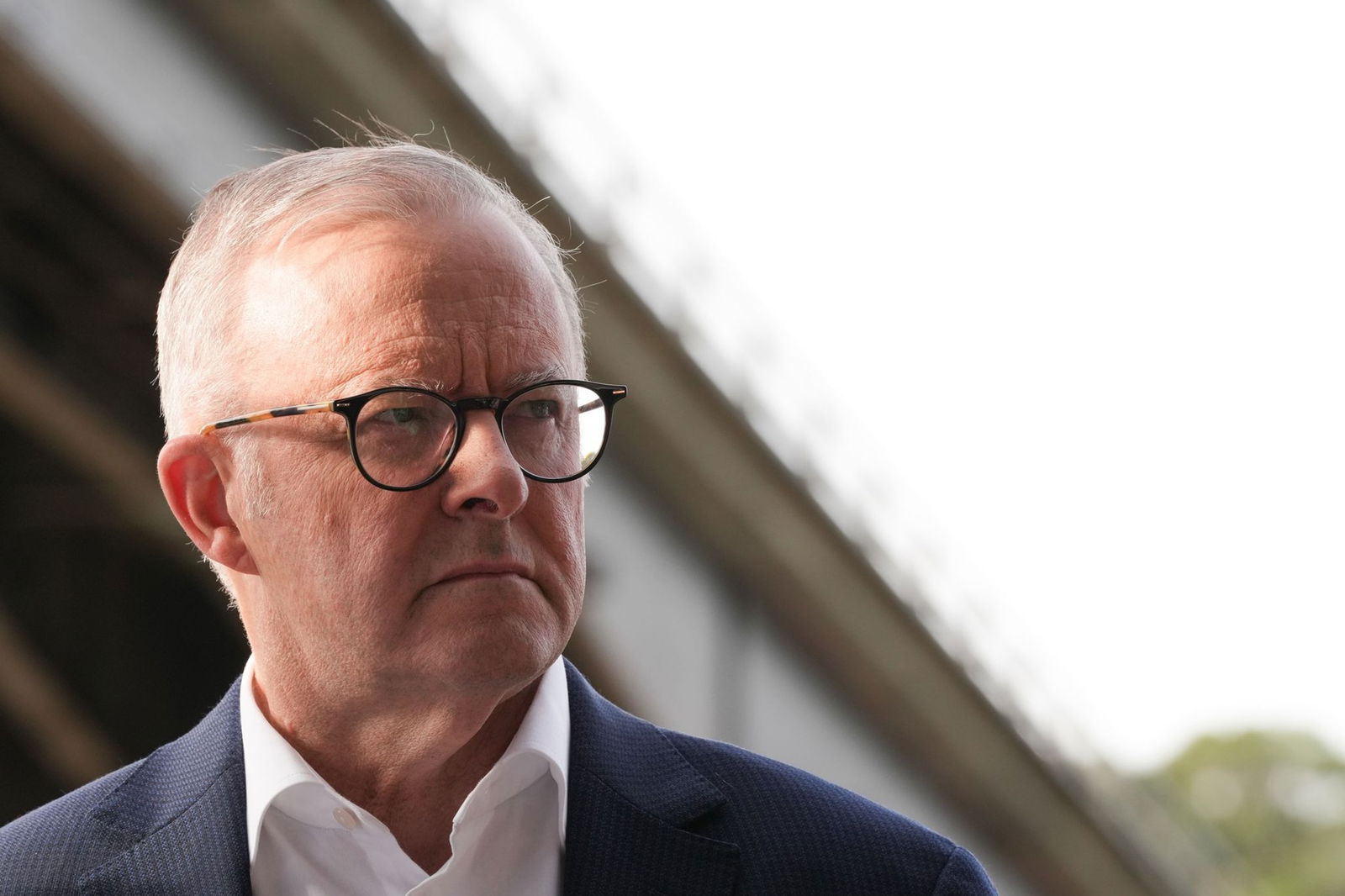
Anthony Albanese says he will never let the Pharmaceutical Benefits Scheme be undermined, as he hit back at US President Donald Trump's threat to slap tariffs on the sector.
The president flagged a "major tariff on pharmaceuticals", designed to force companies to manufacture medicines in the US, was on the horizon.
Speaking to reporters in Cairns, the PM says the PBS is something Australia will never budge on.
"Our PBS is an essential part of who we are. We will never negotiate on it. We will never undermine it," he says.
"That's why, when Australia was negotiating the free trade agreement with the United States, it was Labor that insisted as a condition of our support for that free trade agreement that the PBS not be on the agenda.
"It is still Australia's position, and it always will be Australia's position."
Albanese is speaking to the media in Cairns
Anthony Albanese's second press conference of the day has kicked off. He's standing alongside Matt Smith, Labor's candidate for Leichhardt.
As Stephanie Dalzell reported earlier, Labor is promising to spend almost $250 million for a new bridge over the Barron River on the Kennedy Highway in Cairns, in the electorate of — you guessed it — Leichhardt.
It's a Coalition held seat, but popular MP Warren Entsch is retiring, leaving open the possibility of Labor wresting it away.
Anthony Albanese wishes Entsch well in his retirement as he talked up his candidates chances of winning on May 3.
"You're such a great candidate for this electorate," he says, looking up at Smith who is probably a head or two taller than Albanese.
How does the Coalition's gas plan work?
Sticking with a line of questioning for Frontier Economics managing director Danny Price, Ali Moore asks him to give some detail on the Coalition's gas reserve plan.
"Essentially this reservation policy will ensure that uncontracted gas from the big producers in Queensland will be kept back for the domestic market when it's required," she says.
"What will that mean for my energy bill?"
She observes that the plan would effectively impose a "reverse tariff" on gas exports to disincentivise producers from sending the resource overseas.
"Yeah, so the reason why we're starved of gas or we get expensive prices is because they can earn excessive profit by selling this gas overseas," Price replies.
"And so all we do is say in the proposal, here's an extra export charge to make it more worthwhile to sell domestically at a reasonable price, and if you do that, then you get your export charge back."
On what the cost would be, Price says domestic gas users would see a 7 per cent reduction.
"Of course we use gas and electricity generation, not much, and so you wouldn't expect a big effect, but that's 3% to the average electricity consumer.
"And so a consumer that has both domestic gas and electricity obviously gets both of those benefits."

